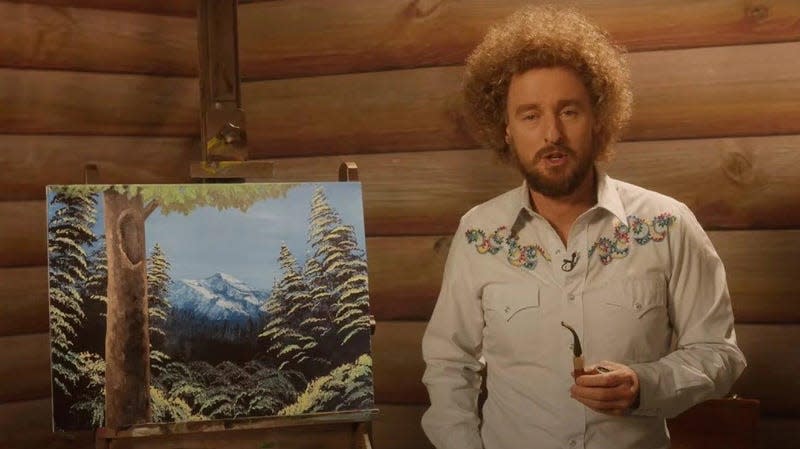Paint Review: Owen Wilson colors outside the lines

- Oops!Something went wrong.Please try again later.
- Oops!Something went wrong.Please try again later.
In the mostly delightful farce Paint, Owen Wilson proves he knows the difference between a comic actor and a comedian who acts. The frequently riotous script by writer-director Brit McAdams feels like it was written with Will Ferrell in mind, circa Anchorman. There’s a savagely satirized and archetypal central character, loosely based on public TV painting instructor Bob Ross; a workplace power struggle nominally embedded in what used to be called the Battle of the Sexes; and ceaseless mockery aimed at the badly aged hairstyles and vehicle habits of the Scooby-Doo era. As a former sketch comic, Ferrell mainly inhabited broad, high-concept characters like NASCAR legend Ricky Bobby, anchorman Ron Burgundy, and Buddy the Elf, all of whom would not have seemed out of place in a ’90s episode of Saturday Night Live.
Paint’s Carl Nargle is a character like that too: the most popular local PBS TV personality in all of Burlington, Vermont—which doesn’t sound like much of an achievement until it starts to slip away from you, as it does from Carl. Sporting a white boy ’fro and driving a Chevy van that could pass for the Scooby-Doo Mystery Machine, Carl is a sexist dinosaur who has bedded the entire female staff of his local PBS affiliate, breaking hearts and compromising productivity in a single swoop. He’s a narcissist too, though he pretends to be the caring, John Denver folkie type. In the early oughts, Ferrell would have had a field day with him.
Read more
Great directors, terrible films: The biggest misses from Hollywood's heaviest hitters
From whoa to woe: Ranking Keanu Reeves’ 20 best performances (and 5 of his worst)
Wilson does too, but it’s a field day of a different type. Carl’s heart is broken, and that’s not a comedy trope in Paint—Wilson makes you feel it, and it’s the buried sorrow that makes Carl run. The love of his life, Katherine (Michaela Watkins, channeling Catherine Keener), cheated on Carl when the local celebrity turned his head, and now she runs the station in all but name. So Carl gets to witness Katherine’s romantic dalliance with Ambrosia (Ciara Renee), the edgy and multicultural street artist hired to replace him.
Wilson, whose dad ran a public television station in Dallas, saw something great in McAdams’ script, and reportedly tried to get it made for years. Wilson isn’t making fun of Carl’s feelings, he’s playing them with every subatomic particle of his hangdog soul. While this doesn’t make Carl less absurd, it does ground him long enough to illuminate the acute sense of male dislocation Carl’s absurdity flows from.
Because from Groundhog Day to Anchorman 2, what are these comedies of emasculation really talking about? If you binge-watch the collected works of Bill Murray and Will Ferrell, pausing only for an occasional stopover in Adam Sandler-land, what materializes behind the schtick is the dread and uncertainty of modern maleness—a fear, expressed through characters of pushy cluelessness, that the world isn’t just changing for men, it’s melting under their feet. When Carl’s facade of nurturing is pierced by the only woman left at the station still taking him seriously—and the spell he’s held over the women in his life is irrevocably broken—he doesn’t deflate like the balloon in the cliche; he collapses, then bluffs, then collapses again, an inflatable tube man at a used car dealership, held together by nothing but air.
Paint - Official Trailer - Feat. Owen Wilson | HD | IFC Films
The fear so many modern men have isn’t that they’ll be laughed at, but that they’ll be laughed at behind their backs, and it may be happening already. The job of a movie like Paint is to draw that laugh out in public—exorcising the demon by externalizing its power. And while it’s possible to quibble about the weirdly sci-fi mix of period signifiers (white boy afros exist beside cellphones), and to look askance at Paint’s rather too blithe approach to sex-in-the-workplace power dynamics, few comedies in recent memory come by their laughs more honestly than Paint does because, like all the best comedies, the laughter is based on a genuine unease.
There’s slapstick comedy here too, including a belly laugh of a scene where Carl smashes his paint covered ‘do into a wall in a desperate attempt to expand his range and save his reputation by painting something other than Vermont’s Mt. Mansfield. Poor Bob Ross’ reputation may not recover. Then again, it tarnished rather quickly once he was gone. But while Carl Nargle may not be much of an artist, thanks to Wilson and McAdams’ care and craft, his own image is indelible.
(Paint opens in theaters on April 7.)
More from The A.V. Club
Sign up for The A.V. Club's Newsletter. For the latest news, Facebook, Twitter and Instagram.

